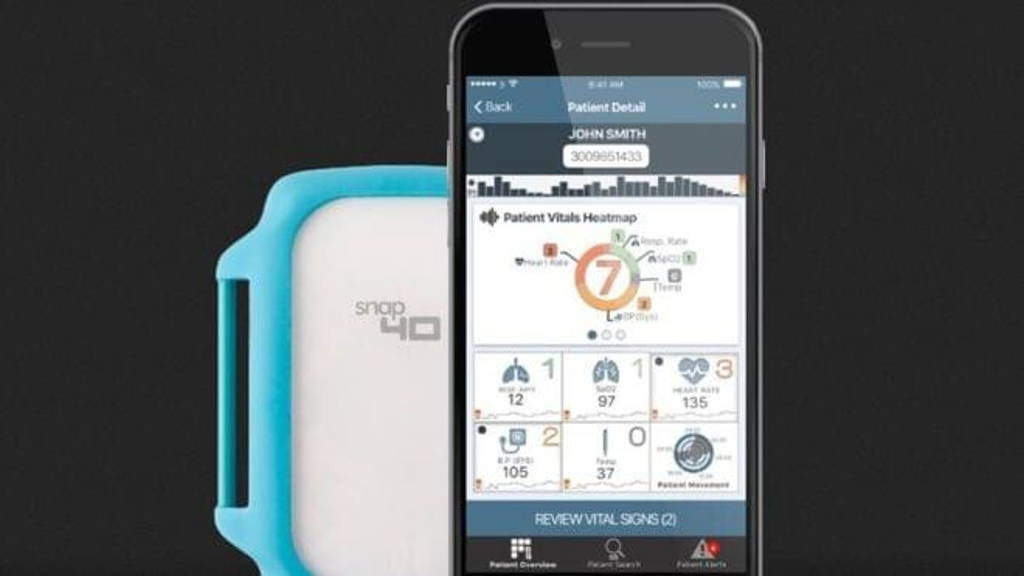The snap40 device continuously collects data while strapped to a patients arm. It monitors six different vital signs: heart rate, respiratory rate, oxygen saturations, temperature, emotion, posture and changes in the blood pressure. It has been created by the Scotland-based snap40. Its CEO and founder is Chris McCann.
His firm has just been awarded £1 million healthcare development contract from NHS England's Small Business Research Initiative. Starting in April and May, the firm will conduct trials on up to 500 patients at the Victoria Hospital, run by NHS Fife, and the Royal Infirmary of Edinburgh, controlled by NHS Lothian. The device has a battery-life of two days, charges wirelessly and transmits patient information by Wi-Fi twice a minute. McCann says the device will only be worn by people admitted to the hospital, but not by anyone under the age of 16, he tells Wired.
###snap40###
"Essentially the device itself measures parameters that indicate if the patient is stable or not," says Alex Baldacchino, NHS Fife research and development director. The snap40 product has already been piloted within the organisation. According to Baldacchino, clinical environments "are not that relaxed around novel technologies" but initial research from the pilot was "very encouraging" and the new tests will prove its feasibility on patients.
For example, Manchester-based startup eLucid mHealth has been awarded test contracts with the NHS to provide patients with medications in a "secure, intelligent container". The natural language AI company Babylon is due to begin a trial in North London where 1.2 million people will receive medical advice from a chatbot.
A lot of time is spent to monitor and prevent a situation that might never happen, says Baldacchino . Devices like the snap40 will give an early warning to a situation if it actually happens, without that time being wasted by nurses taking those measurements.
McCann adds the device doesn’t replace doctors or nurses, but is developed to assist them so they can use their time better. It is hoped the two trials, which will be completed by the end of the year, will be a starting point for expansion in the UK and internationally. "We hope to be in a further seven hospitals – six of them in the UK and one in the US – by the end of this year."
His firm has just been awarded £1 million healthcare development contract from NHS England's Small Business Research Initiative. Starting in April and May, the firm will conduct trials on up to 500 patients at the Victoria Hospital, run by NHS Fife, and the Royal Infirmary of Edinburgh, controlled by NHS Lothian. The device has a battery-life of two days, charges wirelessly and transmits patient information by Wi-Fi twice a minute. McCann says the device will only be worn by people admitted to the hospital, but not by anyone under the age of 16, he tells Wired.
From raw data to vital sign
The snap40 device monitors patients using multiple sensors. It transmits raw signals from six different sensors. "All told, we transmit about 15,000 data points off the device every 30 seconds,” McCann states. Once the data has been collected, the firm's machine learning algorithms analyse the raw data and turn it into a patient's vital signs. The device can then send alerts to medical staff if and when necessary.###snap40###
"Essentially the device itself measures parameters that indicate if the patient is stable or not," says Alex Baldacchino, NHS Fife research and development director. The snap40 product has already been piloted within the organisation. According to Baldacchino, clinical environments "are not that relaxed around novel technologies" but initial research from the pilot was "very encouraging" and the new tests will prove its feasibility on patients.
Improving patient care
The device is one of a number of approaches being taken by different branches of the NHS, and the medical profession generally, to improve patient care. A wearable patch developed by VitalConnect sends vital signs to caregivers and has already been tested in Europe and the USA.For example, Manchester-based startup eLucid mHealth has been awarded test contracts with the NHS to provide patients with medications in a "secure, intelligent container". The natural language AI company Babylon is due to begin a trial in North London where 1.2 million people will receive medical advice from a chatbot.
A lot of time is spent to monitor and prevent a situation that might never happen, says Baldacchino . Devices like the snap40 will give an early warning to a situation if it actually happens, without that time being wasted by nurses taking those measurements.
McCann adds the device doesn’t replace doctors or nurses, but is developed to assist them so they can use their time better. It is hoped the two trials, which will be completed by the end of the year, will be a starting point for expansion in the UK and internationally. "We hope to be in a further seven hospitals – six of them in the UK and one in the US – by the end of this year."






